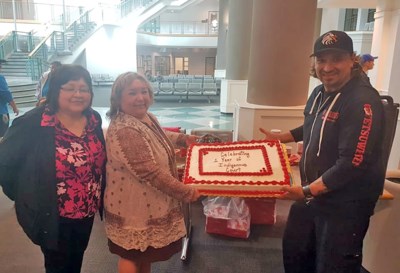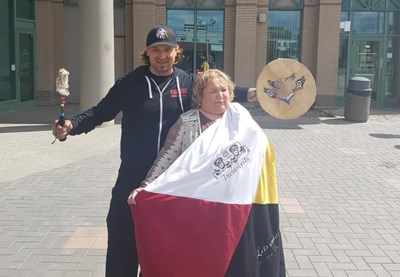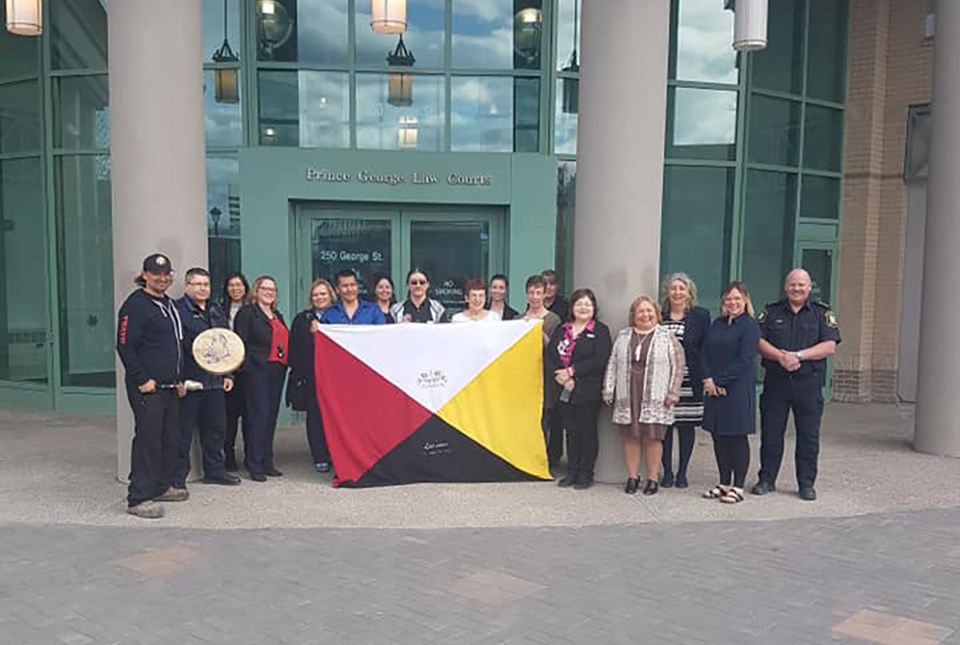It’s now been a year since the Indigenous Court launched in B.C.'s northern capital.
Prince George’s Indigenous Court, which began sitting last year, is the province's sixth; the others operate in New Westminister, North Vancouver, Duncan, Kamloops, and Merritt.
 A special cake marked the one year anniversary. (via Facebook/ Wesley Mitchell).
A special cake marked the one year anniversary. (via Facebook/ Wesley Mitchell). “It’s more of a culture based way to work with elders who are experienced on changing whatever the situation might be,” explains Mitchell.
He says he had been going through some complications in life at the time he entered into the Indigenous Court system.
“It was a point in my life where due to colonialism and a bunch of other things I didn’t really know much about my culture,” said Mitchell, who is Wet’suwet’en, and a member of Tsayu (Beaver Clan).
Indigenous Court is a sentencing court which provides an Indigenous perspective on a holistic and restorative approach, to sentencing Indigenous persons who have acknowledged responsibility.
Local Indigenous Elders and Knowledge Keepers then participate by offering advice on a healing plan.
The judge may incorporate the healing plan in the sentence given to the Indigenous person who has pled guilty.
“I’d have to say since the 2015 Winter Games, I’ve been working on my native culture, drumming, smudging, and learning about sweats and all that kind of stuff,” says Mitchell, adding this led him to start the Khast'an Drummers.
Mitchell says he also struggled with mental health and addictions issues in the past, and going through the Indigenous Court was another way for him to work with the Elders and to learn more about himself.
“It is huge to have that support of the Elders,” says Mitchell. “I’d checked in with the Elders with where I was at in life, with basic counselling and basic things I could let out and share. They would share their experience and their culture, and that is basically what this court system has brought.”
Mitchell says he worked closely for six months with Lori Adams, Tom Reece, and Violet Bozoki who are apart of the Elder’s Justice Council.
 Wesley Mitchell was the first client of Prince George's Indigenous Court. (via Facebook/Wesley Mitchell)
Wesley Mitchell was the first client of Prince George's Indigenous Court. (via Facebook/Wesley Mitchell) “It just gave me the awareness that there is help. That’s a huge thing - right inside of the courthouse there is help for Indigenous people.”
Mitchell says at the one-year-celebration he was able to offer advice to a new Indigenous Court client who also happened to have court that day.
“A lot of people are isolated and feel alone, you know, they are not the most healthiest when they walk into those rooms,” says Mitchell. “But there’s nothing but help in there, it’s all positive energy and it’s all culture based.”
Mitchell says he is happy he can now be an example of positive outcomes.
“It’s an overwhelming feeling when I actually stop and think about it. It’s an overwhelming happiness and for me to be able to do that is an honour,” say Mitchell.
“When you can be 100 per cent honest with yourself and walk into the Indigenous Court and admit your wrongs that is the very first step to change and getting well and making more positive decisions in your life.”



